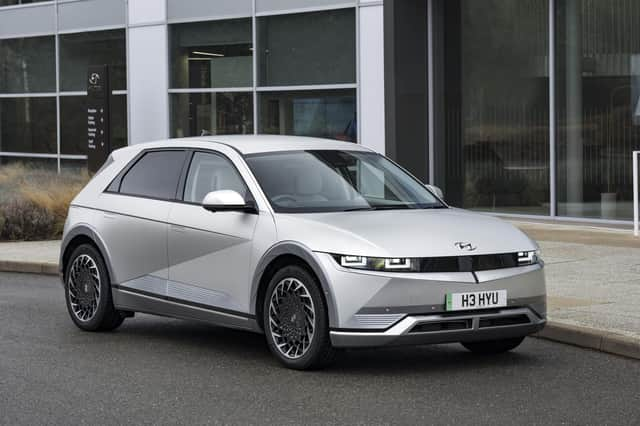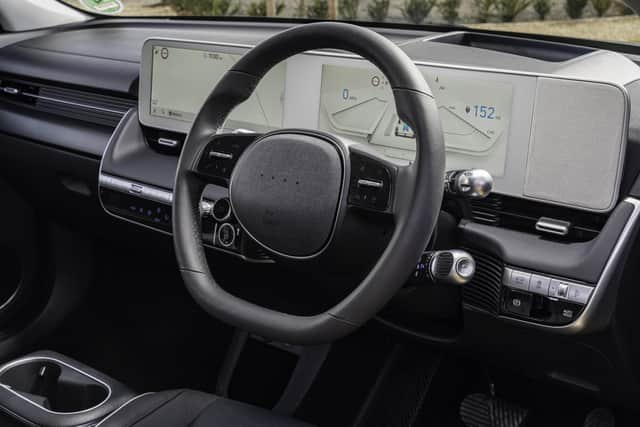Hyundai: how the Ioniq became iconic


You would have quickly decided that it was
good value, reasonably styled and affordable.
Reliability would not have been in question but


you wouldn’t impress other motorists. As a cynical friend once said, Hyundais are for people
who don’t enjoy driving.
My, how things have changed. Hyundai all
of a sudden is a premium brand which stands
comparison with the best that more renowned
marques have to offer.
A friend who knows a thing or two about
premium models (he’s a BMW fan) enthused
about the Ioniq’s styling, and I couldn’t help
but agree. The crisp lines and bold nose are
admirable. Less so the gimmicky door mirrors
which in fact aren’t mirrors at all but cameras.
You don’t look at a mirror but at a mini-screen
on each door.
To be honest, it works better than I imagined
and the image is clearer, but you do wonder if
it’s worth the effort. It is what car designers call
a “surprise and delight” feature, a talking point
if you will. Just because the creative types
Having said that, I warmed to it. I prefer traditional features (handbrakes, glass mirrors
and the like) but I guess we will have to get used
to door-mounted cameras instead.
Things move pretty swiftly in the car industry these days so we have barely got used to the
Ioniq 5 (it landed here in 2021) than we have a
very big update.
This, by the way, is not a hatchback or an
SUV. Rather it is officially something in between – a CUV or crossover utility vehicle.
That’s Hyundai’s title for it and I’m not sure it
will become an everyday term.
There is a new, slightly larger 77.4kWh battery (up from 72.6kWh) at the upper end of the
range, and a more powerful dual-motor configuration to go along with it – 321bhp, enough
for a 0-62mph time of 5.1 seconds.
We are still getting used to the fact that electric power means cars can be pretty quick, even
family-oriented motors like this.
The trim levels have been improved too with
some notable additions to the kit list if you’re
willing to spend. The previous entry point,
SE Connect, has been dropped, so the line-up
now starts with Premium, priced from £42,665
when it’s equipped with a 58kWh battery and
a single 168bhp motor. It’s also available with
the larger pack, though, along with a more potent rear-mounted motor that now produces
225bhp (up from 214bhp), or the upgraded fourwheel-drive configuration. This vehicle features
vehicle-to-load tech, allowing the Ioniq 5 to
power other devices, along with part-leather
upholstery, upgraded interior trim, 64-colour
ambient lighting and a sliding centre console.
There’s no doubt the cabin is impressively different.
There’s also a proposed solution to one of the
Ioniq 5’s biggest flaws, its lack of a rear wiper,
in the shape of a digital rear-view mirror that
shows an image from a camera in the rear portion of the roof.
Ultimate sits above Premium, but it’s no longer the top of the line-up.
That honour goes to the Namsan Edition –
the model tested here.
It costs from £54,150 and gets a full-length
panoramic roof. It also features a heat pump as
standard; this is optional on some of the other
versions, although all Ioniq 5s now get a battery
warmer, for more predictable charging in cold
weather.
You can feel the improvement in the Ioniq 5’s
cabin when you climb into a Namsan. It is still a
really spacious with bags of leg, knee and headroom in the rear seats.
But there’s padded trim in a few more key
areas, and more of the utilitarian grey plastics
have been replaced too, for a more polished
finish.
For me, and for most folks, I imagine this car
will be sporty enough. It is quick in a straight
line and comfortable enough on corners. But
if you really want something firmer and faster,
the Ioniq 5 N can now be ordered with prices
starting from £65,000.
It’s the first in what is predicted to be a new
range of ‘N’ electric vehicles, with this version
being a completely overhauled version of the
firm’s Ioniq 5.
It has been completely reworked by Hyundai’s N performance department, however, and
receives a larger battery than the standard car
while power can be as high as 641bhp when the
car is put into ‘N Grin Boost’ mode. As standard, it produces a still-respectable 600bhp.
The brakes have also been fully upgraded
to help combine the regenerative system with
the traditional hydraulic setup as effortlessly
as possible. It also sits 20mm lower than the
standard car and is 80mm longer due to the
large diffuser. The front end is redesigned with
a new air curtain and active flaps for improved
cooling while an exclusive Luminous Orange
colour is used at the bottom of the bumper and
along the side skirts.
Inside, the centre console has been fitted
with both knee and shin pads to help the driver
to brace when cornering heavily, while the N
bucket seats are finished in a combination of
leather and Alcantara. The seat frames themselves are also positioned 20mm lower than in
the standard car to give a sportier driving position.
Hyundai Ioniq 5 Namsan: £53,665. Ioniq 5 starts
at £42,665; 77.4kWh lithium ion polymer battery
offering 228PS; Single speed reduction gear; 295
miles range; Top speed, not given but 0 to 60mph
is 5.1 seconds; Emissions 0; Five years’ unlimited
mileage warra
